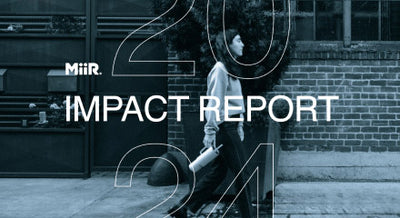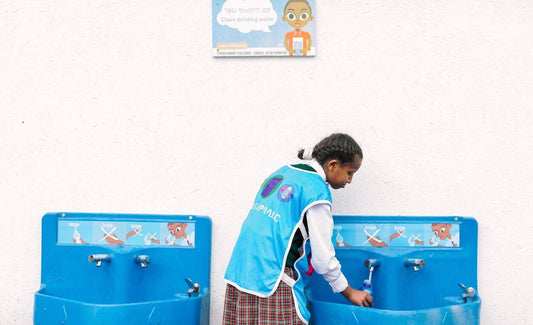Mobilizing Students to Access Education
Together, World Bicycle Relief and MiiR are partnering to mobilize 100 students in Zambia for academic empowerment with the goal to benefit 500 people, based on a multiplier effect of five people per bike.
Education is essential for ending the cycle of disease and poverty. However, in many rural areas across the globe children are denied access to a basic education due to the barrier of distance. World Bicycle Relief’s Bicycles for Educational Empowerment Program (BEEP) provides bicycles to students (70% of them girls), teachers and school volunteers to improve access to education and reduce travel time with a goal to improve educational outcomes.
BEEP Framework
Community Led. Bicycle recipients are selected based on distance traveled and vulnerability criteria established by community members who oversee the program.
Study-to-Own. Students sign a contract whereby the bicycle becomes their personal property after two years. Students agree to attend classes regularly and are encouraged to use the bicycle for improving household livelihood, provided this does not interfere with school attendance.
Appropriate Technology. The Buffalo bicycles used in BEEP are simple, durable bicycles able to withstand the rigors of rural environments.
Sustainable Model. Field Mechanic training keeps WBR’s programs rolling and leads to increased economic opportunities for mechanics, their families and communities.

Why Bicycles?
In the short term, bicycles help children arrive at school less exhausted and help them attend regularly. In the long term, bicycles help children complete their education, preparing them for better jobs and reducing the likelihood of extreme poverty.
Focus on Girl Students
World Bicycle Relief recognizes the value in breaking down barriers for girls, who are often forced to choose between pursuing their education and meeting household obligations. Increasing girls’ access to education has shown to reduce maternal and child mortality rates, lower birth rates, delay marriage and improve economic opportunities for women, households and communities. Gender equality progresses holistically when families and village leaders collectively commit to supporting their girl students riding to school.

Outcomes
Primary Outcomes
- Increased attendance of vulnerable children in community and government schools
- Improved performance of vulnerable children in community and government schools
- Improved retention of girls in junior secondary school
Secondary Outcomes
- Improved teacher attendance and access to professional development activities
- Improved livelihoods of bicycle beneficiaries and their families
- Improved safety and security of students traveling to and from school
Did you know?
- 64% of Zambians live on less than $2/day
- 4.7 million children are living in poverty in Zambia
- 875,000 Zambian children under age 14 are not in school
- YOU can help World Bicycle Relief reach their goal to fund 3,200 bicycles for Zambian students this July. DONATE (Update: World Bicycle Relief's July campaign funded 3,686 bikes!)
About World Bicycle Relief
World Bicycle Relief is mobilizing people through the Power of Bicycles and envisions a world where distance is no longer a barrier to education, healthcare and economic opportunity.
www.worldbicyclerelief.org
As we sunset our incredible partnership with World Bicycle Relief (WBR), we’d like to share a final update on the progress made in the communities since November 2017.
Bicycles for Educational Empowerment Program (BEEP) Impact for 2017
51 total schools reached (additional 6 schools since last update)
49 Bicycle Supervisory Committees (BSC) trained
53 mechanics trained (additional 7 individuals since last update)
89% of schools involved in BEEP attended regular coordination meetings
BSC meetings
These meetings provide a platform for the BEEP schools to share learnings based on experiences, successes, and challenges. BEEP implementation can be reviewed at a local level and planned activities can be harmonized.
Based on feedback from the BSCs, WBR has committed to adopting a more convenient method of data collection and reporting. Schools have reported that paper-based documentation and reporting is resource-heavy and challenging to submit. WBR aims to launch mobile data collection in Zambia in 2018.
IPA Impact Study
The first phase of the study is complete, Innovation for Poverty Action (IPA) and WBR are now well into the data collection phase. The study will rigorously test the impact of having a bicycle on education outcomes such as performance, attendance and retention in school as well as outcomes pertaining to girls’ empowerment and their bargaining position in the households. The findings will contribute to policy discussions and strategies for keeping girls in school.
Across Zambia's Mazabuka, Monze and Kalomo districts a total of 4,000 bicycles have been distributed by World Bicycle Relief. Recipients are as follows:
2,384 girl students (of which MiiR contributed 100)
1,030 boy students
360 members of Bicycle Supervisory Committees
46 mechanics
180 teachers
In these districts WBR rolled out a vigorous, high quality, cluster randomized trial, led by Innovations for Poverty Action (IPA) to assess the impact of BEEP. The one-year research study has two treatment arms to enhance learning on attendance, performance, retention and empowerment outcomes and impact on girls and boys given bicycles as well as the community, siblings and other family members.
Summary of study progress:
- IPA selected 100 schools to participate in the study. 55 are control schools (students did not receive bicycles) and 45 are treatment schools (students received bicycles). Within these schools children in grades 5, 6, and 7 walking more than 3 km were eligible for selection in the study.
- A baseline survey was conducted and interviews administered to 25 girls in grades 5, 6 and 7 to measure baseline learning levels. In addition, attendance data was also collected from registers for both boys and girls enrolled in grades 5, 6, 7. Once the baseline survey was complete, randomization was conducted and the 45 schools to receive bicycles were identified and communicated to WBR.
The following activities have been accomplished by WBR:
- 45 teachers were trained as trainers of trainers (ToTs) in BSC Capacity Building in Mazabuka, Monze and Kalomo.
- The ToTs, in collaboration with WBR and Zambia's Ministry of General Education (MOGE), conducted community sensitization meetings and facilitated the election of BSC members for 45 schools.
- ToTs conducted school level BSC training in the 45 schools while WBR and MOGE provided support and quality check visits to the schools during the trainings.
- 46 Field mechanics were trained for all schools to support bicycle maintenance and repairs.
Overall achievements/successes:
- TaroWorks mobile data collection platform piloted in two schools for scale-up and roll out in 2018.
- Bicycle Supervisory Committees shared BEEP progress and highlighted their local policies used to support program implementation at their schools.
- Monitoring and Evaluation data is being collected on a monthly basis.
- Field mechanics operations are being managed and coordinated to help prolong the bicycle lifespan.










